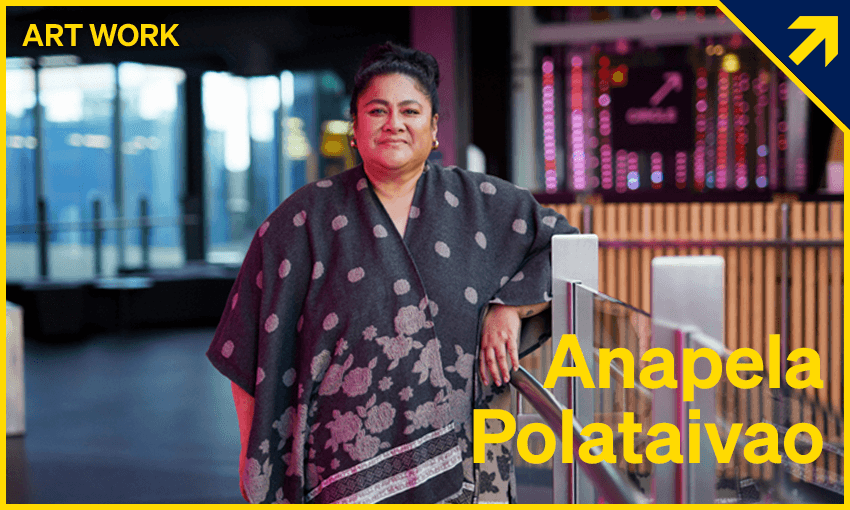The director and actor shares what it means to commit to the work.
Anapela Polataivao ONZM is an award-winning director and actor. She is a recipient of the Arts Foundation New Generation Award (2014), the Contemporary Pacific Art Award (2019), and Best Director at the Auckland Theatre Awards (2016). Her theatre directing work includes Wild Dogs Under My Skirt, Savage Coloniser, Things That Matter and the upcoming theatrical adaptation of Red White and Brass. In 2024, she was awarded an ONZM for her services to Pacific Performing Arts.
What a typical rehearsal day looks like
Sometimes I do have a plan. Sometimes there is no plan. I feel a lot of the time I need to see things in front of me physically to get a general feel of where I need to get to during the day. I just finished a run-through of the show on Saturday and purposely did not do any major edits for fear – but also taking from my past learnings – that I’ve cut too much too soon without seeing the lay of the land.
Once I see that, I can go back and decide what I need and don’t need, where I can get to things a lot quicker. It’s always juggling, juggling all the balls in the air. Often we’re trained in a certain way, or institutionalised, to think there is a right way to do things. Then you’re thrown into the space and you have to make it work for you.
It’s not to say that I’m the be-all-end-all in the process. I’m just a piece of the puzzle, and the world is coming at me hard and fast.
Investing in other artists
I realised very early on that investments in other people were crucial, especially for Pacific Island artists. They’re coming into a world – theatre – that speaks the same language, but is very different in how it has to be executed. Over time, you understand that the thing we do as theatre artists is very dense, it’s very rich, and it’s not something you can just get in four weeks of rehearsal. It takes years to get it into your bones, to really go, “Oh that’s what that is.”
The investment into people’s thinking and bodies – their movement in space, their understanding – is spiritual and it takes a very long time. You’ll see that I work with the same people a lot, because I understand that this is not a gig. It’s a lifelong thing to get into it. It’s a way of being – to actually be the thing you’re trying to express onstage.
When you look at the cast of Savage Coloniser for example, these women also came through Wild Dogs Under My Skirt with me. There was a quality to them – a quality of looking, seeing, being, how we interact with the space. It’s been years and years of practising the thing, and then of course, as I say to them, you know when the words belong to you. You don’t have to reach for it.
Then, when you look at Red White and Brass, there’s someone who I first saw when he was 18, and now he’s in his 30s. There was something that made me think of him when I was thinking about casting this show. I went, “I’m not gonna audition him. I’m gonna throw him in.” It’s something I learned when I was teaching at PIPA (the Pacific Institute of Performing Arts). I would look at an actor and go: “What’s that? That’s an interesting trait. That’s a rare bit of talent.”
He’s now in this show and he’s thriving!
How the appreciation – and the honours – feel
To this day, I still get a shock. I do. I am jolted. When your head is down and you’re working, you’re unaware. People talk about the impact of your work and that’s wonderful. The appreciation of other people has been overwhelming, which is not what I’m actively seeking. There are those of us that just do the thing, and so when awards happens… it’s awesome. Then I get a bit overwhelmed, because it’s a bit much.
But it’s lovely. I’ve embraced all of that, but I’ve never actively gone to put on a show to see what an audience thinks. It’s not my job. It’s not my business, either, to conduct how they think and feel. My loyalty is always to the writer to ensure that what they need to say and do is honoured.
So you just kind of receive it… and move on.
How to keep the work’s integrity
With poetry, like Wild Dogs Under My Skirt and The Savage Coloniser Book, it’s very dense and rich. There’s a formula to this kind of work, because it’s been given to us in a very immovable, robust way from Tusiata [Avia]. It goes back to investing in these peeps and handing it over to them, “It’s all yours. You know how to conduct yourselves.” I need to say very little, because if I keep talking then we’re in trouble!
Over the years, directing these shows with these performers has become more and more… just giving them a look. Everything is shorthand. The great thing about these guys is that they’re adults, they’re not the kids I used to work with. I’m very aware that the meeting place is the work. That is the key. If that is not understood, if lines get blurred, it’s always about refocusing.
There’s two types of us in theatre. There’s those of us who come to do a gig. There’s those of us who come to do the work. It’s not a gig. This is not a gig, guys! If you’re gonna step up, you need to do the work.
And they know, over and above all of it? I will come back to the work.
What would make working as an artist easier
There’s a lot that’s expected of a director working in a mainstage theatre context. Don’t get me wrong, when I was first coming out with KKK (Kila Kokonut Krew), I did everything! We’d build the set, paint the set, costumes, doing everything with zero money. When your lights go off because you haven’t paid your electricity bill, you have to wonder, “Was it right to invest in this show? What do we do?”
In a mainstream setting, it’d be wonderful to have an assistant who can do anything that takes me out of the rehearsal room. When I get in my head, my perfectionist self comes out and it takes me forever to craft something. I was up until three in the morning today just to write a single paragraph for the programme note. I go to myself, “That word is out of place, Bels!”
And also? Money. Sometimes you’ve got to take the gigs that pay the bills, even though your heart might not be in it. Something like Red, White and Brass is a beautiful release in that way. The script is so tight that it feels like I’m really just directing traffic. It’d be wonderful as a freelancer to have annual security. Wouldn’t that be ideal? Wouldn’t that be wonderful? So I could just do the things.
There’s so many things I would like to try my hand at. I’d love to try my hand at doing some writing. I’ve always wanted to do my own one woman show, I want to do my opera again, I want to do a triptych of my last name and what it means in broken up pieces. I want to get those up, and develop them. I’d love, as a freelancer, to do that without having to worry about how to pay my mortgage. There’s so much to do and I’ve got so much to get out before I leave this planet.
The way I’m approaching my work, my own personal works, you get to see where I’m at as an artist. I want grandeur. I want the orchestra. It feels like it’s the only way it can meet the desire, and it can meet my spirit. I need to have catharsis in all my shows, in major ways. If I don’t have to think about how I’m having to pay my mortgage or how to look after my parents and get on with my art, that’s the dream.
Why it’s still so exciting
It’s always the unknown. What am I going to experience today? The magic that comes from that, that comes from willingly falling into that space and not have any preconceived ideas of what to expect. I was thinking this morning in the car, as I was typing away at my laptop on programme notes… “Imagine if the show wasn’t able to go on. Then what do we do?”
It’s about going into the unknown, willingly… and, well, troubleshooting along the way!
Red, White and Brass runs until July 7 at the ASB Waterfront Theatre.

